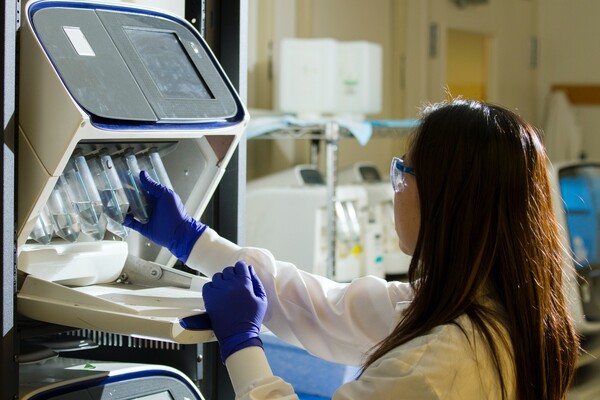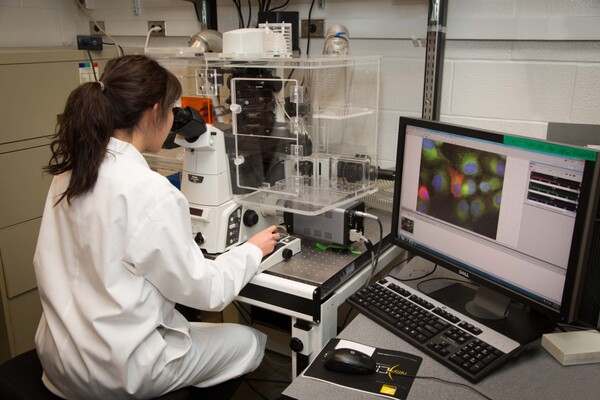
Breadcrumbs
- Home
- Future Students
- Graduate Education
- Explore our Graduate Programs
- Thesis-Based Programs
- Laboratory Medicine & Pathobiology
Laboratory Medicine & Pathobiology
MSc & PhD
In the Department of Laboratory Medicine and Pathobiology (LMP), you choose your research path - whether it's basic, translational, or clinical. As one of the largest and most diverse departments of its kind, LMP offers you unprecedented opportunities to pursue your MSc or PhD degree in Laboratory Medicine and Pathobiology.
We occupy a special place at the interface between basic biomedical science and clinical practice, with research and clinical scientists located on campus and throughout our affiliated hospitals and research institutes.
Join our 390+ world-renowned research-active faculty and 250 graduate students pursuing basic, translational, and clinical research. We are engaged in exciting areas of investigation ranging from molecular and cellular biology, to genomics and bioengineering, that will improve our understanding of fundamental processes and our ability to treat human diseases such as neurological disorders, cardiovascular disease, infectious diseases, diabetes and cancer.
Machine learning and artificial intelligence will play a core role in medical research and patient care in the near future. We are proud to have the Temerty Centre for Artificial Intelligence Research and Education in Medicine (T-CAIREM) based in our department.
We train our research-stream graduate students to think critically and to communicate effectively. As an LMP student, you will be a member of our student union, Confederation of Laboratory Medicine & Pathobiology Students (CLAMPS), that offers academic and research support to all of its members, as well as social and wellness events throughout the year.
Our Programs

In addition to completing a thesis, students take 1.5 FCE*:
- LMP 1001H (Student Seminar Series I, 0.5 FCE)
- LMP 1002H (Student Seminar Series II, 0.5 FCE)
- LMP 1005H (Fundamentals of Research Practice, 0.5 FCE)
Students usually complete this program in two years.
Alumni Profile

David Douda, PhD
I was very impressed with the depth and breadth of research work that occurs at LMP. The department, as a whole, is very student focused and provides a lot of support. It was also apparent that the LMP student body is a very close knit social group, which made it an easy choice for me.
I learned how to be a critical thinker and a good scientist because of my PhD training at LMP.
There are so many essential skills above and beyond bench science that are critical in your success as a professional, no matter what career path you take. LMP has a breadth of training and workshops that are very helpful, such as networking, negotiations and oral presentations.
I’m glad I was in LMP because of the support I received from the program, as well as from my peers. It made this process so enjoyable.
Potential Career Paths
In 2022, the School of Graduate Studies (SGS) tracked the career outcomes of 5,128 PhD students who graduated from the University of Toronto between 2016 to 2021. The data below is from 122 laboratory medicine and pathobiology PhD graduates.
Positions
Some examples of the positions our laboratory medicine & pathobiology graduates held included:
- Biotechnology and pharmaceutical jobs
- Hospital-based jobs
- Postdoctoral fellowships
Employers
Some examples of employers for whom our laboratory medicine & pathobiology graduates worked included:
- The University of Toronto
The chart below shows a percentage breakdown of the various sectors in which our laboratory medicine and pathobiology PhD graduates worked at the time the survey occurred.
Main Employment Sectors of Laboratory Medicine & Pathobiology PhD Graduates
Chart data
| Post-Secondary Education | Private Sector | Public Sector | Charitable Sector | Individual Sector | Info Not Public/Other |
|---|---|---|---|---|---|
| 34.4 | 34.4 | 13.9 | 0 | 0.8 | 17.2 |
By the Numbers
Department of Laboratory Medicine & Pathobiology
*Full course equivalent. A typical 0.5 FCE is over one term (13 weeks), meeting 1-2 times per week. A typical 1.0 FCE is over two terms (26 weeks), meeting 1-2 times per week.
** For full details, please refer to the Laboratory Medicine & Pathobiology PhD Program webpage.
